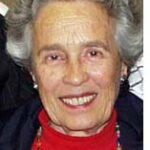Every night I hear her croon the Russian Lullaby. Just a little
plaintive tune when baby starts to cry. Go to sleep my baby,
some day there may be a land that’s free for you and me and the Russian Lullaby. — Irving Berlin
By Eileen Wingard

SAN DIEGO — What memories that song evoked. I remember my mother singing it. And when I heard Hershey Felder, impersonating Irving Berlin, sing it and describe the pogrom in his shtetl in Belarus, I knew that was my family story as well.
My mother escaped to America with her parents and four of her siblings. My grandmother and mother often recalled the trauma of being held at knife point by the bandits who killed many of their neighbors during a pogrom in their town of Yurovitch, also, in Belarus. My mother said that a whistle was sounded, signaling the bandits to regroup , and credits that with saving their lives. My grandmother recalled taking off her gold wedding ring to give them as ransom.
At Felder’s performance, we were three generations sharing the evening, I, my son-in-law, my youngest daughter, and my granddaughter. I was happy to see that Berlin’s songs were familiar and spoke to my children and grandchild as well as to me.
Felder’s wonderful one-man portrayal of the great songwriter, currently being shown at the San Diego Repertory Theatre until January 7, included several more songs I remembered from my early childhood. My immigrant mother wanted to give me every opportunity, enrolling me in dancing, singing and elocution classes at the Jewish People’s Institute on Chicago’s westside. There, as a five-year-old, I learned to sing “Alexander’s Ragtime Band” and “Oh, How I Hate to Get Up in the Morning,” with expressive gestures and improvised bugle calls. I also recall the family gathering around the radio in 1938 to hear Kate Smith’s inspiring rendition of “God Bless America.” That became so popular that many wanted it to replace “The Stars Spangled Banner” as our national anthem.
Berlin’s songs had beautiful, tuneful melodies, clever words that were comprehensible, and sung to accompaniments that enhanced the meaning and did not cover the lyrics with incessant electronic beats.
Some of his melodies were influenced by the nigunim of his Cantor father, Moses Beilin. Others were more jazzy. Many of his songs like “White Christmas” and “Easter Bonnet,” have become classics.
Once again, as he has done with his theater pieces on Gershwin, Beethoven, Chopin, Bernstein, and Tchaikowsky, Felder deftly interweaves the life of the composer with his music.
Berlin’s is a rags to riches story from immigrant poverty, selling newspapers and working as a singing waiter, to marrying a wealthy debutante and being hailed as one of the greatest American songwriters of the 20th century.
Bravo, Hershey Felder, and Bravo, Irving Berlin.
*
Wingard is a retired violinist with the San Diego Symphony and a freelance writer. She may be contacted via eileen.wingard@sdjewishworld.com